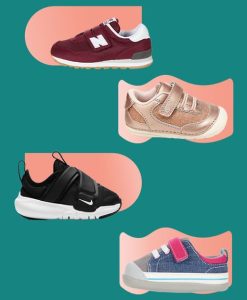What shoes should I wear for my baby? Tiny toes are adorable, and you might be tempted to dress them up in cute shoes. But babies’ feet are still growing and developing, so it’s important to choose footwear that protects their little feet without hindering their natural movement.
Here’s a guide to help you decide what shoes are right for your baby at each stage:
Barefoot is Best for Newborns and Pre-walkers
Natural Development:
The American Academy of Pediatrics (AAP) recommends keeping babies barefoot as much as possible during their first year. This allows their feet to grow freely and develop strong muscles and tendons.
Grippy Socks for Slippery Surfaces:
If your baby needs a little more grip on slippery surfaces, choose soft socks with silicone grippers on the soles.
Choosing Shoes for First Steps
- Supportive and Flexible: Once your baby starts walking, they’ll need shoes that provide some support and protection. Look for shoes with flexible soles that bend easily at the toes.
- Good Fit is Essential: Shoes that are too big or too small can cause blisters and discomfort. It’s important to get your baby’s feet measured by a professional to ensure a good fit.
- Secure Fasteners: Choose shoes with laces, velcro straps, or other fasteners that can be adjusted for a snug fit.

Features to Look for in Baby Shoes
What shoes should I wear for my baby? Here are some additional features to consider when choosing shoes for your baby:
- Breathable Materials: Look for shoes made from breathable materials like leather or canvas. This will help keep your baby’s feet cool and dry.
- Rounded Toes: Shoes with rounded toes allow your baby’s toes to wiggle and spread naturally.
- Supportive Back Counter: A slightly reinforced back counter can help provide some stability for your baby’s ankles.
When to Avoid Shoes
- Indoors: There’s usually no need for shoes indoors on soft surfaces like carpet or wood floors. Barefoot time is important for healthy foot development.
- Warm Weather: In warm weather, sandals or open-toed shoes can be a good option for outdoor wear.
- Learning to Walk: When your baby is just starting to walk, they may not need shoes at all. Bare feet provide the best sensory feedback and allow for a more natural walking motion.

Safety Tips for Baby Shoes
- Check the Fit Regularly: Babies’ feet grow quickly, so it’s important to check the fit of their shoes regularly. You can do this by having your baby stand on a piece of paper and tracing their foot. The outline of their foot should fit comfortably inside the shoe tracing.
- Inspect the Shoes Regularly: Look for any worn-out areas or loose seams that could cause blisters or discomfort.
- Avoid Hand-Me-Down Shoes: Shoes can lose their shape and support over time. It’s best to get new shoes for your baby.
Shoes can be a fun way to express your baby’s style, but they shouldn’t be the priority. The most important thing is to choose footwear that supports your baby’s healthy foot development. When in doubt, consult with your pediatrician for guidance on what shoes are right for your baby.
What shoes should I wear for my baby? Strong, healthy feet are essential for a lifetime of balance and mobility. Here’s a look at why choosing the right footwear is important for your baby’s development:
- Strong Muscles and Tendons: Barefoot time allows babies to wiggle and grip with their toes, which helps develop strong muscles and tendons in their feet.
- Sensory Awareness: Feeling different textures with their bare feet helps babies learn about their environment and develop sensory awareness.
- Natural Walking Gait: Barefoot walking allows babies to develop a natural walking gait, which is important for proper balance and coordination.

Sock Options for Non-Walking Babies
Socks can be a great choice for keeping your baby’s feet warm and providing some grip on slippery surfaces. Here are some things to consider when choosing socks for your baby:
- Soft and Breathable Materials: Look for socks made from soft, breathable materials like cotton or bamboo. These will help keep your baby’s feet comfortable and prevent sweating.
- Snug Fit: Socks that are too loose can slip off, while socks that are too tight can restrict blood circulation. Choose socks that fit snugly but comfortably around your baby’s ankles.
- Grippy Soles: If your baby needs a little more traction on slippery surfaces, choose socks with silicone grippers on the soles.
Importance of Getting Properly Fitted Shoes
Once your baby starts walking, they will eventually need shoes that provide some support and protection. Here’s why getting properly fitted shoes is important:
- Proper Fit Promotes Healthy Foot Development: Shoes that fit well will help keep your baby’s feet aligned properly and prevent future foot problems.
- Comfort and Safety: Shoes that are too big can cause blisters and make it difficult for your baby to walk safely. Shoes that are too small can restrict growth and cause discomfort.
When it comes to getting your baby’s shoes fitted, it’s always best to consult with a professional shoe salesperson or pediatrician. They can measure your baby’s feet and recommend shoes that provide the right fit and support.
What shoes should I wear for my baby? As your baby gets older and more mobile, they’ll need shoes that can keep up with their active lifestyle. Here are some things to consider when choosing shoes for active play:
When choosing shoes for your baby, consider the weather conditions. Here are some tips:





